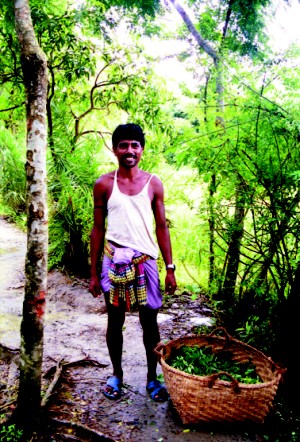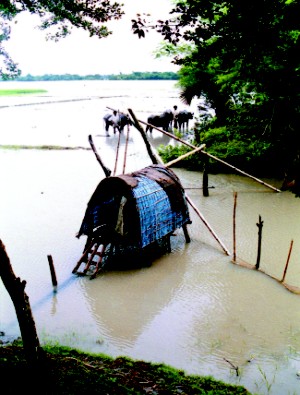| Home - Back Issues - The Team - Contact Us |
 |
| Volume 10 |Issue 26 | July 08, 2011 | |
|
|
Musings The Cow Lottery Andrew Eagle Goru chor or cow thief: under normal circumstances it's not a term of endearment.
In a new language, words are like stepping stones across a stream. The more words you have the easier it is to cross, the less you have to jump; the more words there are, the easier it is to make Bangla-shaped friendships in a village; but with more words the meaning of each one is less. The first basic words, like amma, abbba, mother and father, kukur and that less polite other word for dog, came from Comilla. At Jayanta's house in Kolkata, Ma used to fire rapid Bangla at me from the start, not even slowing down and although I did not comprehend the lengthy monologues, I did learn to call salt nimok and water jol. Simple words of that sort meant a lot. They were not merely food items, they were an understanding. How thrilled I was in more recent years in Kolkata to be told by a number of strangers 'you have such a Dhaka accent,' though in saying Dhaka they meant Bangladesh in general. They meant the salt and water as lobon and pani. I don't imagine my accent is really very good but how pleasing to be described as having any kind of native accent at all. But I digress. Most of my Bangla comes from Hatiya and it started in the tea shops, but of course; it started with pointing. The tea shop customers would indicate something and name it. I'd parrot. There were the easy words: table, hurricane, glass and cup, with only the different pronunciations to master. There were the three versions of 'you', aamne, toyie and tui in Hatiyan, and no book to consult. There were all the hideous titles, both in Hatiyan and standard Bangla, the bhai, apa or bubu, Miah, chacha, kaka or kaku, mama or ma'u, dada, dadu, dadi and didi etc. Which belonged to whom? There was a time I'd just get creative and let loose, slinging titles together to address someone as 'aamne boro choto bhai tumi Mia hagol kaka Saheb' or some other random configuration. The correct title had to be in there somewhere, in accordance with the laws of probability. They were all my Bangla teachers, in the tea shops. They'd point and say Bella biscuit and I'd say, 'Bella biscuit.'
Where words are few it's anecdotes and shared memories that can fill out the silences to make new relations. With Emran I learnt how to criticise his tea, though it was no Prionkor-style brew. I'd tell him, in singular words, it was so bad I'd only pay fifty poisha, half-price; he'd say it was so good it cost two taka, double price. And we'd argue. Truth is when he'd sit cups down in a row Situ would sometimes try to steal mine because it was always the best: extra milk. And let's not mention the time he served up a cup of dishwater for a joke, when he was a fraction late in stopping me from imbibing it such that it got sprayed across the table upon tasting. In Emran's case I was soon minding the shop, though I could barely speak to the customers and knew what nothing apart from tea actually cost, when he'd go home for lunch or something. I used to take the change from the drawer when I was in charge and hide it somewhere; the other customers would laugh to see it, and then, everybody straight-faced in anticipation, Emran would return and whenever the first customer paid he'd automatically open the drawer to get change and find it empty. He knew who to blame. I don't remember why it was the two of them, Emran and my Yusup Kaku or Yusup Uncle, who is more or less the same age as me, who each earned the title goru chor. I'm not sure either how Yusup became Kaku. Was it something to do with Alauddin? Whatever the cause for many years I've been calling out to Yusup with a hearty 'Kakooooooo! Eh, Kakoo!' and he addresses me as bhatija or nephew. It might've been for that most important of village reasons, the Noakhaila because-because, that they became cow thieves. It might've been because being a cow thief is a very bad thing to be so whenever I'd suggest it both Emran and Yusup would get so embarrassed while everybody else was laughing. And when Situ was there to translate I'd embellish with the, 'they're very nice people in the daytime, but at night, make sure your cows are safe!' or 'please Emran, please Kaku, please give up your cow-stealing!' They suffered for several years with my periodic antics, until I wondered if I shouldn't buy them a cow, one each. Ah, that was because Yusup Kaku already had a cow; it might have been his major asset. He was proud of it, large and well-fed; he showed it to me when visiting his place one day. And his life was and is hard; he'd stay up all night fishing in the canal. He used to set up a seesawing triangular-framed net to catch those tiny fry they sell by the roadside at about six a.m. each morning.
I went to the cow market that takes place on the school field on market day evenings; and one of the neighbours, a self-proclaimed cow expert, had already searched out and located two calves that looked healthy enough. The first was a jungle-cow, caught from the mangrove forests along the edge of the Bay of Bengal where they roam freely; it had no manners and would kick at the earliest opportunity. The second was as placid as a water lily; shy and timid. In my absence the market authorities had decided to waive the small local tax paid on such transactions on account of me being the purchaser. They shouldn't have done that. I was just presented with two proud certificates of ownership: it was the sole evening of my life that I owned any description of livestock. You'd think leading a cow is a straightforward matter, and I of course took the placid one while someone else led the jungle-cow kicking and bucking up the road. But I'd never led a cow before and I didn't know whether to be firm or gentle, especially when it refused to move; so it got a mixture of both and must have been completely confused until ultimately it fell over. It was embarrassing. I couldn't do a simple thing like lead the world's most sedate and cooperative cow. Eventually we got to the tea shop; it was late. We decided the following morning we'd have a little lottery, a flip of a coin, to see who got the jungle-cow and who owned the well-behaved one. By morning a small crowd had gathered to witness the spectacle, and via Situ I was busily explaining that once they had these new bovines, their rustling days should be at an end. Absolutely embarrassed as usual, they agreed to desist. With the coin toss my livestock-owning hours ended: Emran took the jungle-cow and Yusup Kaku the other. We drank tea. A few months later Situ called me in Sydney. 'Your Yusup Kaku wants to know if it's alright to sell his cow.' He wanted to invest in a new fish business. Copyright (R) thedailystar.net 2011 |


